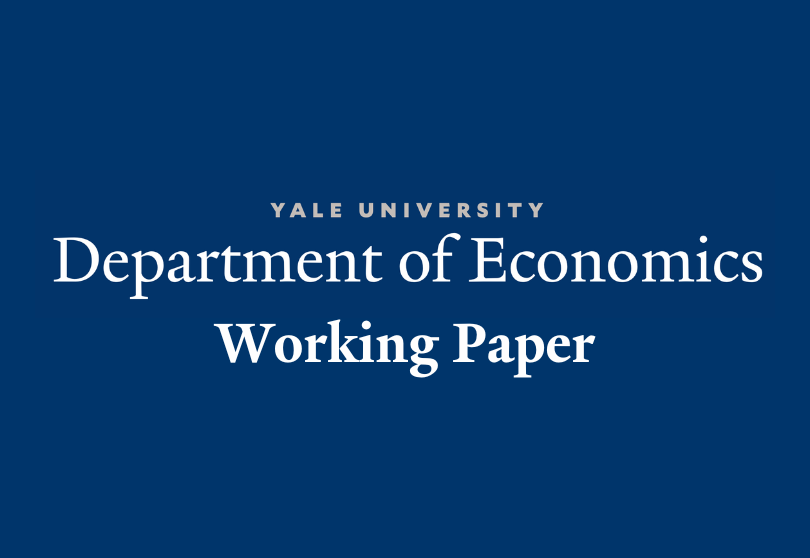Building Reputations in Digital Labor Markets: Meet PhD Student Jingyi Cui

How can online workers with valuable skills but lacking credentials break into competitive digital marketplaces? Do employers have sufficient incentives to hire and screen new workers? For Yale Economics PhD candidate Jingyi Cui, these questions lie at the heart of her research on reputation building in digital labor markets—an interest that traces back to her undergraduate days at Yale.
A Decade at Yale, and a Spark for Economics
Cui arrived at Yale as an undergraduate planning to explore different fields, but two courses stood out in her journey to dive further into economics.
“The first person who planted a seed for me to pursue economics seriously was Professor Phil Haile,” she explained. “I was in his Industrial Organization class and during office hours he mentioned that maybe I should consider doing a Phd. I didn't really think about it at the time, but another year passed and I took Professor Johannes Hörner's Game Theory class and something really clicked.”
After working for Professor Hörner over the summer, and then writing a senior thesis on multi-armed bandit problems under his guidance, Cui went straight into Yale’s PhD program. Though her early work was purely theoretical, she began focusing on empirical Industrial Organization (IO) and labor topics—an evolution she credits to the foundation that her second-year field courses provided.
“Bidding for Reputation” in Digital Labor Markets
Cui’s job market paper, tentatively titled “Bidding for Reputation in Online Labor Markets,” explores employer learning and wage dynamics on a labor platform. She draws on proprietary data from a major freelancing platform that connects millions of workers—many of whom can be hired remotely for tasks like software development or translation—to employers looking for short-term help. The platform matches workers to employers through “job auctions,” where workers bid wages for employers to choose.
“Reputation in these settings takes the form of reviews,” Cui said. “Employers rely on those reviews when deciding whom to hire, especially if they’re working with someone halfway across the world who they’ve never met.”
However, it’s hard to get hired without any reviews, and impossible to be reviewed if you’ve never been hired. According to Cui’s findings, workers solve this conundrum by bidding low—sacrificing wages initially to secure positive feedback. After accumulating solid reviews, they can raise their wages.
“By hiring and reviewing new workers, employers generate valuable information about these workers for the market," Cui said. "One goal of my project is to measure the externalities employers create through hiring new workers. Workers’ wage adjustments make this question both more challenging and more interesting.”
Cui uses a dynamic model of employer learning and forward-looking bidding to answer these questions. An advantage of the setting of online labor markets is that workers’ reputation is easily observed and can be linked to wage bids. Moreover, the marketplace is governed by clear matching and wage-setting rules, allowing Cui to apply the machinery of Industrial Organization.
“I see myself as bringing together the IO literature on dynamic games and reputations to answer a question important to labor.”
A Supportive Community and Wealth of Opportunities
Cui has been part of the Yale community for nearly a decade—first as an undergraduate, then as a doctoral student. Throughout that journey, she’s relished the department’s culture of openness and collaboration.
“I’ve really enjoyed working with my classmates on research,” she said. “I have multiple co-authors who are fellow grad students. Beyond that, we’ve had countless rounds of tennis, karaoke nights, and dinner parties. The camaraderie we’ve built in the basement of 30 Hillhouse is something I’ll always cherish.”
She also noted how faculty from different fields engage with each other’s work. It was in a trade course with guest lectures by Michael Peters that Cui first glimpsed how service trade—and, by extension, remote freelance work—could shape the global economy. Meanwhile, the Industrial Organization sequence introduced rigorous empirical methods that Cui now applies to study digital labor markets.

“It has been great working with Jingyi on this project. But no one of us has answers to all the challenges that come up in a project like this. Jingyi gets input from many faculty members across fields, and it shows. This collaborative advising culture is one of the things I really like about the culture of our Department. It not only helps the students, but I learn more this way myself.”
— Phil Haile, Ford Foundation Professor of Economics
Looking Ahead
As she refines her “Bidding for Reputation” project, Cui continues to examine other aspects of the evolving nature of work. With her classmate Samuel Solomon, she has written about the cross-border hiring of white-collar workers, using data from a global payroll company. In an ongoing project, she seeks to understand the impact of artificial intelligence on labor market signaling, where tools like ChatGPT have made it much easier to craft cover letters.

Working Paper
The Global Market for Remote White-Collar Jobs
Authors: Jingyi Cui, Samuel M. Solomon
Ultimately, Cui hopes her research will shed light on the new ways in which firms and workers connect and collaborate:
“Labor platforms play an increasingly vital role in connecting firms and individuals across the world. We need to have a better understanding of how labor markets work in the digital age — and Yale has equipped me with the tools to explore it.”